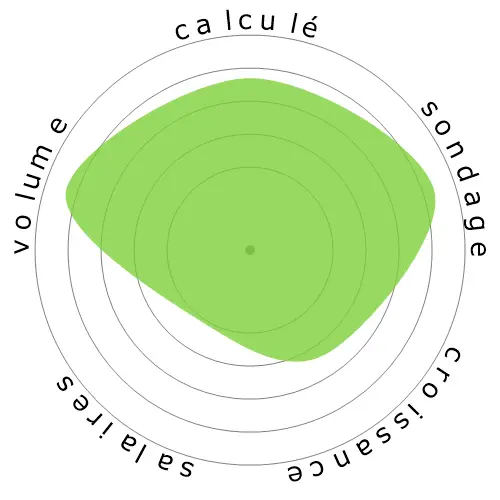Infirmiers praticiens et infirmiers professionnels autorisés




Les gens ont également vu
Risque d'automatisation calculé
Risque Faible (21-40%) : Les emplois à ce niveau présentent un risque limité d'automatisation, car ils nécessitent un mélange de compétences techniques et centrées sur l'humain.
Plus d'informations sur ce que représente ce score et comment il est calculé sont disponibles ici.
Sondage utilisateur
Nos visiteurs ont voté qu'il y a peu de chances que cette profession soit automatisée. Cette évaluation est davantage soutenue par le niveau de risque d'automatisation calculé, qui estime 24% de chances d'automatisation.
Que pensez-vous du risque de l'automatisation?
Quelle est la probabilité que Infirmiers praticiens et infirmiers professionnels autorisés soit remplacé par des robots ou l'intelligence artificielle dans les 20 prochaines années ?
Croissance
On s'attend à ce que le nombre de postes vacants pour 'Licensed Practical and Licensed Vocational Nurses' augmente 2,6% d'ici 2033
Emploi total, et estimations des offres d'emploi
Les prévisions mises à jour sont attendues 09-2025.
Salaires
En 2023, le salaire annuel médian pour 'Licensed Practical and Licensed Vocational Nurses' était de 59 730 $, soit 28 $ par heure.
'Licensed Practical and Licensed Vocational Nurses' ont été payés 24,3% de plus que le salaire médian national, qui était de 48 060 $
Salaires au fil du temps
Volume
À partir de 2023, il y avait 630 250 personnes employées en tant que 'Licensed Practical and Licensed Vocational Nurses' aux États-Unis.
Cela représente environ 0,42% de la main-d'œuvre employée à travers le pays
Autrement dit, environ 1 personne sur 240 est employée en tant que 'Licensed Practical and Licensed Vocational Nurses'.
Description du poste
Prendre soin des patients malades, blessés, en convalescence ou des personnes handicapées dans les hôpitaux, maisons de retraite, cliniques, maisons privées, foyers de groupe et institutions similaires. Peut travailler sous la supervision d'une infirmière diplômée. Licence requise.
SOC Code: 29-2061.00


Commentaires
As an example, take the humanised skill of empathy. Empathy is the emotional skill to understand and share the feelings of another person. This shared emotional connection is something many, if not all, patients crave and desire. Empathy is something that AI cannot replicate well. In order for empathy to occur between two individuals, both individuals must be capable of emotions. Humans are capable of emotions, but AI robots are not. Emotions are biological, chemical, and mental reactions to certain stimuli. These reactions are uniquely inherent to organic living biological beings. An AI robot is not an organic living being, and thus cannot produce emotions. The best an AI can do is be programmed in a way to say certain things when a patient exhibits particular facial responses or verbal/tonal nuances. However, there is more to empathy than just being responsive. There exists a shared feeling that a human can only feel with another human, or another animal, especially when one of those humans is in a medically ill or injurious state.
Critical thinking serves as another example of a humanised skill that AI will find difficult to replicate. Critical thinking is the intellectual act of considering certain concepts, and constructing a charitable and objective take on said concepts through abstract reasoning or empirical evidence. To further this, the more unique and nuanced those concepts are, the more difficult it will be to critically think about said concepts. In the healthcare settings that LVNs find themselves in, there exists many unique concepts, or in this case, situations. I will illuminate one and that would be the case of patients with severe dementia. Patients with this mental condition may showcase behaviour that includes, but not limited to, loud screaming, random crying and potential desires for killing. What to do with these kind of patients is something LVNs face on a daily basis. Should the LVN just ignore the patient? Doing so may endanger the patient to him or herself, or worse, endanger other patients situated in the same room. Ignoring patients is also considered abuse in healthcare settings. On the other hand, ignoring the patient may allow the LVN to give care to other patients with much more debilitating conditions in the meantime, and thus allowing the LVN efficient time management. The LVN can also attend to that patient first, but only to administer medication that will calm him down, and make the LVN’s work less difficult. This may prove detrimental, if a family member of another patient asked the LVN to administer medicine to him first, because he missed a dose earlier in the day. With all this in mind, one can see how as an LVN there are many factors that they have to consider when making a reasonable decision, such as proper ethics, personal feelings, logical order of work, and so on. The LVN must be able to evaluate these factors and utilise his intellectual capacity for reason to support making the right decision. An AI’s intellectual capacity is much more rigid than a human’s mind. An AI robot cannot improvise at any given moment in the same fashion as a human. Unique situations, such as the aforementioned dementia case, requires a mind being able to asses many nuanced factors unique to the situation. Unfortunately, AI is just not capable yet of such critical thinking.
Laissez un commentaire sur cette profession